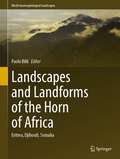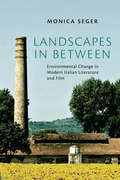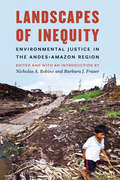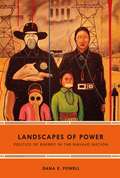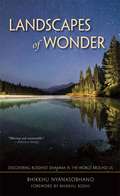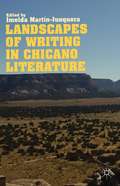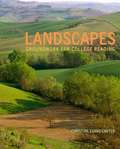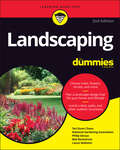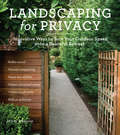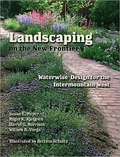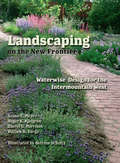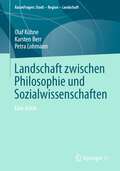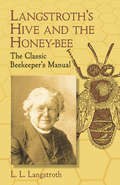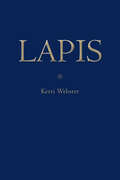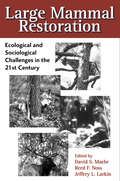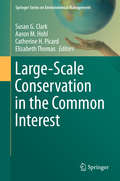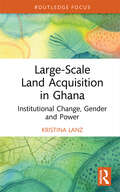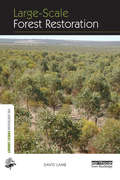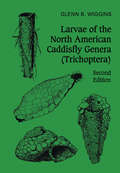- Table View
- List View
Landscapes and Landforms of the Horn of Africa: Eritrea, Djibouti, Somalia (World Geomorphological Landscapes)
by Paolo BilliThis book focuses on regions for which until now the geomorphology was very poorly studied and relatively unknown. Nevertheless, the landforms and landscapes of the Horn of Africa are highly attractive, diverse and in a few cases unique, since they span very different environments, from highland plateaus and mountains to lowlands (even below sea level) and coastlines with a high degree of diversity and from monsoon to arid climate conditions. The main topics addressed in the book include the links between the geological evolution and the current large scale geomorphology of the Horn of Africa; the large differences between the highlands and lowlands climate, river hydrology and their variation through time within a climate change perspective. This part of the world was home of the very first hominids. The landscape in which they lived and evolved throughout the Pleistocene is described in comparison with the arid and inhospitable, though immensely scenic, environment of today. Perennial and ephemeral rivers with very different morphology, processes, and hydrology drain the area, and, in combination with the past and recent uplift, substantially contributed to provide the region with peculiar landscapes and landforms. Long lasting weathering and erosion processes result in a typical inselberg landscape such as the Bur region, or the currently exposed flatland of old peneplain surfaces. Their changes through time, induced by both natural and anthropogenic factors, are addressed by a couple of case studies. Though the region has few inhabitants, they had to struggle to find their livelihood in a land that offers poor resources. This resulted in landscape change and land degradation. Examples of human impact on the landscape are presented at different scales. This book provides readers interested in geography and geomorphology with essential scientific and educational information on the Landscapes and Landforms of Eritrea, Djibouti and Somalia through simple, though scientifically, rigorous texts illustrated with several color maps and photos. One main prerogative of this book is therefore to give an insight into a region of the world where, for geographical and historical constraints, geomorphological investigation was very limited, thus enriching its intrinsic informative value.
Landscapes in Between
by Monica SegerSince its economic boom in the late 1950s, Italy has grappled with the environmental legacy of rapid industrial growth and haphazard urban planning. One notable effect is a preponderance of interstitial landscapes such as abandoned fields, polluted riverbanks, and makeshift urban gardens. Landscapes in Between analyses authors and filmmakers - Italo Calvino, Pier Paolo Pasolini, Gianni Celati, Simona Vinci, and the duo Daniele Ciprì and Franco Maresco - who turn to these spaces as productive models for coming to terms with the modified natural environment.Considering the ways in which sixty years' worth of Italian literary and cinematic representations engage in the ongoing dialogue between nature and culture, Monica Seger contributes to the transnational expansion of environmental humanities. Her book also introduces an ecocritical framework to Italian studies in English. Rejecting a stark dichotomy between human construction and unspoilt nature, Landscapes in Between will be of interest to all those studying the fraught relationship between humanity and environment.
Landscapes of Inequity: Environmental Justice in the Andes-Amazon Region
by Nicholas A. Robins Barbara J. FraserThe natural wealth of the Amazon and Andes has long attracted fortune seekers, from explorers, farmers, and gold panners to multimillion-dollar mining, oil and gas, and timber operations. Modern demands for commodities have given rise to new development schemes, including hydroelectric dams, open cast mines, and industrial agricultural operations. The history of human habitation in this region is intimately tied to its rich biodiversity, and the Amazon basin is home to scores of indigenous groups, many of whom have populations so small that their cultural and physical survival is endangered.Landscapes of Inequity explores the debate over rights to and use of resources and addresses fundamental questions that inform the debate in the western Amazon basin, from the Andes Mountains to the tropical lowlands. Beginning with an examination of the divergent conceptual interpretations of environmental justice, the volume explores the issue from two interlocking perspectives: of indigenous peoples and of economic development in a global economy. The volume concludes by examining the efficacy of laws and policies concerning the environment in the region, the viability and range of judicial recourse, and future directions in the field of environmental justice.
Landscapes of Power: Politics of Energy in the Navajo Nation
by Dana E. PowellIn Landscapes of Power Dana E. Powell examines the rise and fall of the controversial Desert Rock Power Plant initiative in New Mexico to trace the political conflicts surrounding Native sovereignty and contemporary energy development on Navajo (Diné) Nation land. Powell's historical and ethnographic account shows how the coal-fired power plant project's defeat provided the basis for redefining the legacies of colonialism, mineral extraction, and environmentalism. Examining the labor of activists, artists, politicians, elders, technicians, and others, Powell emphasizes the generative potential of Navajo resistance to articulate a vision of autonomy in the face of twenty-first-century colonial conditions. Ultimately, Powell situates local Navajo struggles over energy technology and infrastructure within broader sociocultural life, debates over global climate change, and tribal, federal, and global politics of extraction.
Landscapes of Promise: The Oregon Story, 1800-1940
by William G. Robbins William CrononBefore the first white trappers reached the Oregon country in the late 18th century, Native Americans had already had a profound impact on the landscape by regularly burning forest undergrowth to open grazing land for elk and deer. Europeans and Americans, however, viewed the land as a series of commercial opportunities and exploited resources they believed to be unlimited. Drawing upon newspaper accounts, journals, and a host of other primary sources, the author explores human activity in Oregon and the attitudes which affected it.
Landscapes of Wonder
by Bhikkhu Bodhi Bhikkhu Nyanasobhano"To most of us there have come exceptional, unworldly moments, like unsuspected deeps in a stream, when we fell through appearances - fell through ourselves - into an intuition of majesty and wonder." - Bhikkhu Nyanasobhano in Landscapes of Wonder Landscapes of Wonder deftly transports the spirit of Buddhist contemplation off the cushion and into the natural world. With a lyricism and spiritual immediacy reminiscent of Thoreau and Emerson, in eighteen meditational essays Bhikkhu Nyanasobhano considers Buddhist themes through the prism of nature. The reflections captured in these satisfying literary explorations will appeal to all who appreciate contemplation of the natural world and our place in it.
Landscapes of Writing in Chicano Literature
by Imelda Martín-JunqueraAdding nuance to a global debate, esteemed scholars from Europe and North and Latin America portray the attempts in Chicano literature to provide answers to the environmental crisis. Diverse ecocritical perspectives add new meaning to the novels, short stories, drama, poetry, films, and documentaries analyzed in this timely and engaged collection.
Landscapes: Groundwork for College Reading
by Christine Evans CarterThis all-in-one book takes a metacognitive approach to teaching reading skills while integrating study strategies and vocabulary into every chapter in a meaningful way; offering modeled help as well as abundant, varied practice; and including two authentic textbook chapter applications for real-to-life academic readings students are expected to be able to complete.
Landscaping For Dummies
by National Gardening Association Bob Beckstrom Lance Walheim Teri Dunn Chace Philip GirouxCreate an eye-catching outdoor oasis with this no-nonsense guide to landscaping As families spend more time at home, they're expanding their living space to their yards, decks, and patios. When you're ready to upgrade the look of your landscape, Landscaping For Dummies offers advice on installing fences and walkways, choosing hardy plants and trees, and enhancing natural habitats for the critters and creatures lurking in your neighborhood. You'll find out how to make your backyard a relaxing retreat space and discover the enjoyment and satisfaction that comes from working in your yard. Landscaping For Dummies includes: Lists of recommended plants and varieties, including the best ones for privacy plantings, low-maintenance groundcovers, and small gardens Advice on how to deal with special landscaping concerns, including fire-prone areas, bee and butterfly gardens, and drought-tolerant and native landscapes Instructions on installing permanent features like decks, patios, fences, and more Pointers on how to water more efficiently, including the latest tools and technologies that can save you time With a little bit of planning and some digging, trimming, or planting, you'll be set to enjoy your yard whenever the mood strikes. Let Landscaping For Dummies be your guide to making the most of your outdoor space.
Landscaping for Privacy: Innovative Ways to Turn Your Outdoor Space into a Peaceful Retreat
by Marty WingateThe area around your home is your haven, your sanctuary, your refuge from the noise and irritation of traffic, eyesores, and nosy neighbors. Or at least it could be if there was some sort of barrier between your front yard and the sidewalk, or if you didn't have to stare at the back of the neighbors' garage when you want to relax on your patio. Landscaping for Privacy brims with creative ideas for minimizing or even eliminating the nuisances that intrude on your personal outdoor space. Scores of real-world examples show you how to keep the outside world at bay by strategically placing buffers (such as berms or groups of small trees), barriers (such as fences), and screens (arbors or hedges, for example) around your property. And the helpful plant lists tell you precisely which varieties to choose in order to enhance your sense of seclusion. If you've ever felt frustrated by the lack of privacy whenever you step outside your home, this inspiring book will steer you toward an achievable solution.
Landscaping on the New Frontier
by Susan E. Meyer Roger K. Kjelgren Darrel G. Morrison William A. VargaA practical volume for the home or business owner on landscaping with native, drought-tolerant plants in the Rocky Mountain West. Filled with color illustrations, photos, and design sketches, over 100 native species are described, while practical tips on landscape design, water-wise irrigation, and keeping down the weeds are provided. In this book you will learn how to use natural landscapes to inspire your own designed landscape around your business or home and yard. Included are design principles, practical ideas, and strong examples of what some homeowners have already done to convert traditional "bluegrass" landscapes into ones that are more expressive of theWest. Landscaping on the new Frontier also offers an approach to irrigation that minimizes the use of supplemental water yet ensures the survival of plants during unusually dry periods. You will learn how to combine ecological principles with design principles to create beautiful home landscapes that require only minimal resources to maintain.
Landscaping on the New Frontier: Waterwise Design for the Intermountain West
by Susan E. Meyer Roger K. Kjelgren Darrel G. Morrison William A. Varga Bettina SchultzA practical volume for the home or business owner on landscaping with native, drought-tolerant plants in the Rocky Mountain West. Filled with color illustrations, photos, and design sketches, over 100 native species are described, while practical tips on landscape design, water-wise irrigation, and keeping down the weeds are provided. In this book you will learn how to use natural landscapes to inspire your own designed landscape around your business or home and yard. Included are design principles, practical ideas, and strong examples of what some homeowners have already done to convert traditional "bluegrass" landscapes into ones that are more expressive of theWest. Landscaping on the new Frontier also offers an approach to irrigation that minimizes the use of supplemental water yet ensures the survival of plants during unusually dry periods. You will learn how to combine ecological principles with design principles to create beautiful home landscapes that require only minimal resources to maintain.
Landschaft zwischen Philosophie und Sozialwissenschaften: Eine Kritik (RaumFragen: Stadt – Region – Landschaft)
by Olaf Kühne Karsten Berr Petra LohmannDie Befassung mit ‚Landschaft‘ hat in den letzten Jahren in der Öffentlichkeit und den Wissenschaften an Bedeutung gewonnen. Verbunden war dies nicht vorwiegend mit den Konflikten, die sich in den letzten Jahren um physische Manifestationen der Verminderung von und Anpassung an den anthropogenen Klimawandel ergaben. In Philosophie und Sozialwissenschaften haben sich – nicht zuletzt ausgehend von einem gemeinsamen Bezugspunkt der ‚Philosophie der Landschaft‘ von Georg Simmel aus dem Jahre 1913 – unterschiedliche Traditionen im Umgang mit ‚Landschaft‘ entwickelt. Diese werden in dem vorliegenden Buch hinsichtlich ihrer Tauglichkeit einer Kritik unterzogen, Antworten auf die landschaftsbezogenen Herausforderungen der Gegenwart, sowohl in Bezug auf Wissenschaft, aber auch Gesellschaft zu leisten. Diese Kritik basiert auf einem eigens hierfür entwickelten kategorialen System, das sich zwischen den Dimensionen Konkretheit-Abstraktheit und wissenschaftsintern-wissenschaftsextern aufspannt. Zentrale herausgearbeitete Kritikpunkte sind neben einer unzureichenden Begriffsarbeit und einer ‚Individuenvergessenheit‘ beider Disziplinen auch die Reduzierung des Landschaftsbegriffs auf den Naturbegriff in der philosophischen Landschaftsforschung.
Landslides (Leveled Readers 4.6.2)
by Linda HartleyWhat happens when tons of rocks and dirt slide down a mountain?
Langstroth's Hive and the Honey-Bee: The Classic Beekeeper's Manual
by L. L. LangstrothThe first descriptive treatise of modern bee management. In a reader-friendly, enthusiastic style, Langstroth addresses every aspect of beekeeping: bee physiology; diseases and enemies of bees; the life-cycles of the queen, drone, and worker; bee-hives; the handling of bees; and many other topics. 25 plates.
Lapis (Wesleyan Poetry Series)
by Kerri WebsterIn Lapis, poet Kerri Webster writes into the vast space left by the deaths of three women: her mother, a mentor, and a friend. Using a wide array of lyric forms and meditations, Webster explores matrilineages both familial and poetic, weaving together death, spirituality, women, and a sense of the shifting earth into one "doctrine of Non-linear Revelation." Elegy And I was equal to my longing:the mums blackening; sorrow a carboned figurine; the firmament steaming; your ashesinterred in the boulder;the ugly birds crying dolor dolor dolor;the sky smoke-choked—what, then, would you have had be my register?As the beasts of the field rub their antlers off with ooh-itch pleasure; as the screen says You often open around this time; as the grapesblight: listen: sometimes we're the pilgrim, sometimes we're the site.
Large Carnivore Conservation: Integrating Science and Policy in the North American West
by Susan G. Clark Douglas Clark D. Scott Slocombe David J. Mattson Rebecca Watters Avery C. Anderson Linaya Workman William M. Pym Micheal L. Gibeau Seth M. Wilson Gregory A. Neudecker James J. Jonkel J. Daniel Oppenheimer Lauren Richie David N. Cherney Christina MilloyStrategies for protecting wolves, mountain lions, and more—by taking the human species into account as well: &“Very valuable.&”—Journal of Wildlife Management Drawing on six case studies of wolf, grizzly bear, and mountain lion conservation in habitats stretching from the Yukon to Arizona, Large Carnivore Conservation argues that conserving and coexisting with large carnivores is as much a problem of people and governance—of reconciling diverse and sometimes conflicting values, perspectives, and organizations, and of effective decision making in the public sphere—as it is a problem of animal ecology and behavior. By adopting an integrative approach, editors Susan G. Clark and Murray B. Rutherford seek to examine and understand the interrelated development of conservation science, law, and policy, as well as how these forces play out in courts, other public institutions, and the field. In combining real-world examples with discussions of conservation and policy theory, Large Carnivore Conservation not only explains how traditional management approaches have failed to meet the needs of all parties, but also highlights examples of innovative, successful strategies and provides practical recommendations for improving future conservation efforts. &“Building on decades of work, this book integrates biological knowledge with human dimensions study and charts a course for coexistence with large carnivores.&”—Douglas W. Smith, Senior Wildlife Biologist, Yellowstone National Park
Large Carnivores and the Conservation of Biodiversity
by Joel Berger Justina Ray Robert Steneck Kent H. RedfordLarge Carnivores and the Conservation of Biodiversity brings together more than thirty leading scientists and conservation practitioners to consider a key question in environmental conservation: Is the conservation of large carnivores in ecosystems that evolved with their presence equivalent to the conservation of biological diversity within those systems? Building their discussions from empirical, long-term data sets, contributors including James A. Estes, David S. Maehr, Tim McClanahan, AndrFs J. Novaro, John Terborgh, and Rosie Woodroffe explore a variety of issues surrounding the link between predation and biodiversity: What is the evidence for or against the link? Is it stronger in marine systems? What are the implications for conservation strategies? Large Carnivores and the Conservation of Biodiversity is the first detailed, broad-scale examination of the empirical evidence regarding the role of large carnivores in biodiversity conservation in both marine and terrestrial ecosystems. It contributes to a much more precise and global understanding of when, where, and whether protecting and restoring top predators will directly contribute to the conservation of biodiversity. Everyone concerned with ecology, biodiversity, or large carnivores will find this volume a unique and thought-provoking analysis and synthesis.
Large Mammal Restoration: Ecological And Sociological Challenges In The 21St Century
by David Maehr Jeffery L. Larkin Melvin E. Sunquist Reed F. NossEvidence is mounting that top carnivores and other large mammals play a pivotal role in regulating ecosystem health and function, yet those are the species that are most likely to have been eliminated by past human activities. In recent decades, numerous efforts have been undertaken to return some of the species that were previously extirpated on local or regional scales.Large Mammal Restoration brings together for the first time detailed case studies of those efforts, from restoring elk in Appalachia to returning bison herds to the Great Plains to the much-publicized effort to bring back the gray wolf to Yellowstone National Park. Together these case studies offer important lessons and new ways of thinking for wildlife managers and conservation biologists involved with restoration programs. Sections examine: approaches to determining the feasibility of a restoration program critical hands-on aspects of restoring large mammals obtaining public input into the process and gaining community support for programs the potential of some species to return without direct human intervention, and what can be done to facilitate that natural colonization An introductory chapter by Reed F. Noss explores some of the reasons for restoring large mammals, as well as some of the ecological and social complications, and a concluding overview by David S. Maehr discusses the evolutionary importance of large mammal restoration. Contributors include Paul C. Paquet, Barbara Dugelby, Steven H. Fritts, Paul R. Krausman, Larry D. Harris, Johnna Roy, and many others. Large Mammal Restoration brings together in a single volume essential information on the lessons learned from previous efforts, providing an invaluable resource for researchers and students of conservation biology and wildlife management as well as for policymakers, restoration advocates, and others involved with the planning or execution of a restoration program.
Large-Scale Conservation in the Common Interest
by Susan G. Clark Aaron M. Hohl Catherine H. Picard Elizabeth ThomasMany people working toward sustainability recognize the important role of conservation but are inadequately prepared to deal with the large spatial, temporal and complexity scales that are involved in large-scale conservation efforts. Problems in large-scale conservation require navigating an intermixture of geophysical, biological and political dimensions. Coming to grips with these many natural and human forces and factors at large scales, much less the myriad details in any single case, is challenging in the extreme and becomes more critical with each day that passes. Large-scale conservation poses many complex challenges that single disciplines, approaches or methods cannot fully address alone. Interdisciplinarity can significantly strengthen large-scale conservation efforts. Throughout Large-Scale Conservation in the Common Interest the editors and authors argue that a more holistic and genuinely interdisciplinary approach is required to solve the complex and growing challenges associated with large-scale conservation. The chapters within offer such an approach and define key terms, bring challenges to light and employ case studies to offer concrete practical and strategic recommendations to help those who are engaged in the interactive tasks of promoting sustainability and human dignity. This book is intended for a broad audience, including students and professors new to the field of large-scale conservation, experienced field-based practitioners in science and management and decision and policy makers who set specific and strategic direction for large landscapes. Professors can use this book to introduce students to the challenges of successful large-scale conservation design and implementation and to teach interdisciplinarity as a framework, concept and tool. Professionals will find this book offers a new way of using science, management and policy to make decisions. Finally, this volume can be used as a guide to set up workshops, seminars, or projects involving diverse people and perspectives.
Large-Scale Land Acquisition in Ghana: Institutional Change, Gender and Power (Routledge Studies in Global Land and Resource Grabbing)
by Kristina LanzThis book examines a large-scale land acquisition project for rice production in Ghana’s Volta Region, which has been purported by some to be a social and ecological showcase of a company entering a "community–private partnership" with affected communities. Celebrated by national and international media, the project has received substantial amounts of funding from various donor organisations and claims to empower women through its much-lauded outgrower project. Although discourses of "development", "sustainability" and "women’s empowerment" are used by the investment company, the state and the customary authorities to legitimise the large-scale land acquisition, this book highlights how the deal benefits mainly the powerful elite, including elite women, and generally increases the depreciation of those already most marginalised, such as poor female-headed households and settler communities that were dependent on resources from the commons now enclosed and transformed into a rice farm. The author adopts a New Institutionalist perspective in social anthropology in order to analyse how this land acquisition has been implemented in a plural institutional context and how different actors use different rules and regulations and associated legitimating discourses to increase their bargaining power and to pursue their own interests in a changing legal context. In addition, this perspective shows how benefits and losses are distributed along different intersecting axes of power, such as class, gender, clan membership and age. By focusing on power, gender and legitimisation strategies in the context of institutional change caused by the large-scale land acquisition, this book fills a gap in the literature on large-scale land acquisitions while contributing to the development of a theoretical perspective on institutional change, power relations and ideological legitimisation. This book will be of great interest to students and scholars of land and resource grabbing, agricultural development and agribusiness, land management and development studies more broadly.
Large-scale Forest Restoration (The Earthscan Forest Library)
by David LambLandscapes are being degraded and simplified across the globe. This book explores how forest restoration might be carried out to increase landscape heterogeneity, improve ecological functioning and restore ecosystem services in such landscapes. It focuses on large, landscape-scale reforestation because that is the scale at which restoration is needed if many of the problems that have now developed are to be addressed. It also shows how large-scale forest restoration might improve human livelihoods as well as improve conservation outcomes. A number of governments have undertaken national reforestation programs in recent years; some have been more successful than others. The author reviews these to explore what type of reforestation should be used, where this should be carried out and how much should be done. For example, are the traditional industrial forms of reforestation necessarily the best to use in all situations? How can forest restoration be reconciled with the need for food security? And, are there spatial thresholds that must be exceeded to generate economic and environmental benefits? The book also examines the policy and institutional settings needed to encourage large-scale reforestation. This includes a discussion of the place for incentives to encourage landholders to undertake particular types of reforestation and to reforest particular locations. It also considers forms of governance that are likely to lead to an equitable sharing of the costs and benefits of forest restoration.
Larvae of the North American caddisfly genera (trichoptera)
by Glenn B. WigginsCaddisflies are one of the most diverse groups of organisms living in freshwater habitats, and their larvae are involved in energy transfer at several levels within these communities. Caddisfly larvae are also remarkable because of the exquisite food-catching nets and portable cases they construct with silk and selected pieces of plant and rock materials.This book is the most comprehensive existing reference on the aquatic larval stages of the 149 Nearctic genera of Trichoptera, comprising more than 1400 species in North America. The book is invaluable for freshwater biologists and ecologists in identifying caddisfly in the communities they study, for students of aquatic biology as a guide to the diverse fauna of freshwater habitats, and for systematic entomologists as an atlas of the larval morphology of Trichoptera.In the General Section, the biology of caddisfly larvae is considered from an evolutionary point of view. Morphological terms are discussed and illustrated and a classification of the Nearctic genera is given. Techniques are outlined for collecting and preserving larval specimens and for associating larval with adult stages. The Systematic Section begins with a key to larvae of the 26 families of North American Trichoptera. Each chapter in this section is devoted to a particular family, providing a summary of biological features and a key to genera, followed by a two-page outline for each genus with illustrations facing text. This outline provides information on general distribution, number of species, distinctive morphological features, and biological data including construction behaviour.An important feature of the book is the habit illustrations of larvae and cases of a selected species in each genus, along with illustrations of details of significant morphological structures. Each generic type is thus presented as a recognizable whole organism adapted in elegant ways to particular niches of freshwater communities.This revised edition includes advances in knowledge on the classification and biology of Trichoptera up to 1993 - an interval of 17 years since the first edition. An additional eight families and thirteen genera are included for the first time. Through reorganization of the families into three suborders, a biological context has been established for the systematic section.
Las enseñanzas secretas de las plantas: La inteligencia del corazón en la percepción directa de la naturaleza
by Stephen Harrod BuhnerRevela el uso de la percepción directa en la comprensión de la naturaleza, las plantas medicinales, y la sanación de las enfermedades humanas • Explora las técnicas utilizadas por los pueblos aborígenes y occidentales para aprender directamente de las propias plantas, incluidas las técnicas de Henry David Thoreau, Goethe, y Masanobu Fukuoka, autor de The One Straw Revolution [La revolución de una brizna de paja] Todos los pueblos antiguos y aborígenes afirman que sus conocimientos sobre remedios botánicos provienen de las propias plantas y no de la experimentación a través de pruebas y errores. El autor Stephen Harrod Buhner explora minuciosamente esta modalidad de cognición holística basada en el corazón a través de la obra de Luther Burbank, quien cultivó la mayoría de las plantas alimenticias que ahora consumimos sin pensar en su procedencia, y del gran poeta y científico alemán Goethe. Los lectores obtendrán los medios necesarios para recopilar información directamente del corazón de la naturaleza, aprender los usos medicinales de las plantas diagnosticar enfermedades, y comprender el proceso de creación de alma que se engendra mediante esa profunda conexión con el mundo.
Las frutas que comemos
by Gail GibbonsThis beloved primer on our favorite fruits is now available in a newly translated Spanish edition!Berries, apples, melons, and grapes; oranges, grapefruits, bananas -- yum! This Spanish translation of Gail Gibbons&’ most scrumptious picture book, derived from the newly updated edition, offers young Spanish-language readers an inviting, information-packed cornucopia of facts about our favorite fruits. The clear, simple Spanish text presents fruit facts galore: the parts of fruits, where and how they grow, harvesting, processing, where to buy them, and how to enjoy them as part of a healthy diet. Illuminating illustrations and diagrams in Gail Gibbons&’ signature style accompany this accessible and engaging picture book in Spanish.
